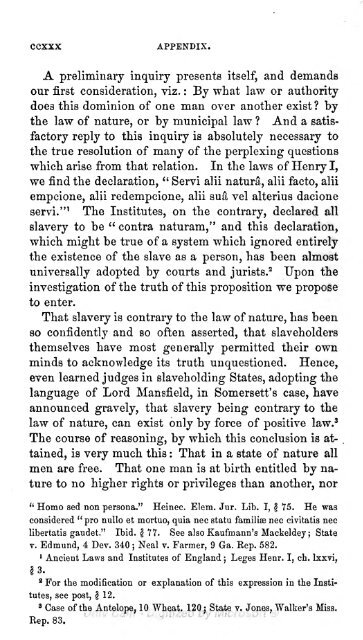Untitled - African American History
Untitled - African American History
Untitled - African American History
Create successful ePaper yourself
Turn your PDF publications into a flip-book with our unique Google optimized e-Paper software.
CCXXX APPENDIX.<br />
A preliminary inquiry presents itself, and demands<br />
our first consideration, viz. : By what law or authority<br />
does this dominion of one man over another exist ? by<br />
the law of nature, or by municipal<br />
law ? And a satis-<br />
factory reply to this inquiry is absolutely necessary to<br />
the true resolution of many of the perplexing questions<br />
which arise from that relation. In the laws of Henry I,<br />
we find the declaration, " Servi alii natura, alii facto, alii<br />
empcione, alii redempcione, alii sua vel alterius dacione<br />
servi." 1 The Institutes, on the contrary, declared all<br />
slavery to be " contra naturam," and this declaration,<br />
which might be true of a system which ignored entirely<br />
the existence of the slave as a person, has been almost<br />
universally adopted by courts and jurists. 2<br />
Upon the<br />
investigation of the truth of this proposition we propose<br />
to enter.<br />
That slavery is contrary to the law of nature, has been<br />
so confidently and so often asserted, that slaveholders<br />
themselves have most generally permitted their own<br />
minds to acknowledge its truth unquestioned. Hence,<br />
even learned judges in slaveholding States, adopting the<br />
language of Lord Mansfield, in Somersett's case, have<br />
announced gravely, that slavery being contrary to the<br />
law of nature, can exist only by force of positive law. 3<br />
The course of reasoning, by which this conclusion is at-<br />
tained, is very much this : That in a state of nature all<br />
men are free. That one man is at birth entitled by na-<br />
ture to no higher rights or privileges than another, nor<br />
" Homo sed non persona." Heinec. Elera. Jur. Lib. I, 75. He was<br />
considered "pro nullo et mortuo, quia nee statu familiaB nee civitatis nee<br />
libertatis gaudet." Ibid. 77. See also Kaufmann's Mackeldey; State<br />
v. Edmund, 4 Dev. 340 ; Neal v. Farmer, 9 Ga. Rep. 582.<br />
1 Ancient Laws and Institutes of England ; Leges Henr. I, ch. Ixxvi,<br />
l.i.<br />
2 For the modification or explanation of this expression in the Insti-<br />
tutes, see post, g 12.<br />
3 Case of the Antelope, 10 Wheat. 120 ; State v. Jones, Walker's Miss.<br />
Rep. 83.


